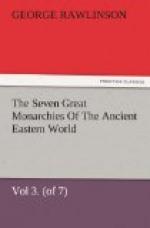The habits of the Medes in the early part of their career were undoubtedly simple and manly. It has been observed with justice that the same general features have at all times distinguished the rise and fall of Oriental kingdoms and dynasties. A brave and adventurous prince, at the head of a population at once poor, warlike, and greedy, overruns a vast tract, and acquires extensive dominion, while his successors, abandoning themselves to sensuality and sloth, probably also to oppressive and irascible dispositions, become in process of time victims to those same qualities in another prince and people which had enabled their own predecessor to establish their power. It was as being braver, simpler, and so stronger than the Assyrians that the Medes were able to dispossess them of their sovereignty over western Asia. But in this, as in most other cases of conquest throughout the East, success was followed almost immediately by degeneracy. As captive Greece captured her fierce conqueror, so the subdued Assyrians began at once to corrupt their subduers. Without condescending to a close imitation of Assyrian manners and customs, the Medes proceeded directly after their conquest to relax the severity of their old habits and to indulge in the delights of soft and luxurious living. The historical romance of Xenophon presents us probably with a true picture when it describes the strong contrast which existed towards the close of the Median period between the luxury and magnificence which prevailed at Ecbatana, and the primitive simplicity of Persia Proper, where the old Arian habits, which had once been common to the two races, were still maintained in all their original severity. Xenophon’s authority in this work is, it must be admitted, weak, and little trust can be placed in the historical accuracy of his details; but his general statement is both in itself probable, and is also borne out to a considerable extent by other authors. Herodotus and Strabo note the luxury of the Median dress, while the latter author goes so far as to derive the whole of the later Persian splendor from an imitation of Median practices. We must hold then that towards the latter part of their empire the Medes became a comparatively luxurious people, not indeed laying aside altogether their manly habits, nor ceasing to be both brave men and good soldiers, but adopting an amount of pomp and magnificence to which they were previously strangers, affecting splendor in their dress and apparel, grandeur and rich ornament in their buildings, variety in their banquets, and attaining on the whole a degree of civilization not very greatly inferior to that of the Assyrians. In taste and real refinement they seem indeed to have fallen considerably below their teachers. A barbaric magnificence predominated in their ornamentation over artistic effort, richness in the material being preferred to skill in the manipulation. Literature, and even letters, were very sparingly cultivated.




